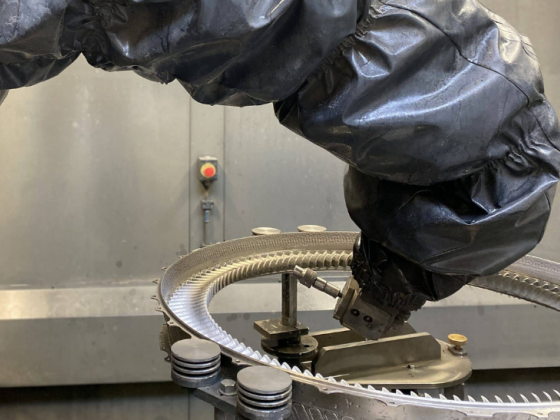Technologies of Industry 4.0 in Smart Factory
The manufacturing practice adopted by smart factories – smart manufacturing – is the most optimized application of technologies arising from the fourth industrial revolution known as Industry 4.0.
The smart factory is not about deploying one software across the entire shop floor and seeing immediate improvements in the production process. A combination of various Industry 4.0 technologies contributes to the optimization of smart manufacturing. Here are the most important enabling technologies:
Industrial IoT (IIoT)
Industrial IoT refers to interconnected devices, machines, and/or processes that are linked by data communication systems to facilitate the exchange and the use of data between people and machines. Typically, these instruments have sensors that collect meaningful data points on a cloud or off-line database for tracking and identifying ways to improve the manufacturing process. Industrial IoT enables operational efficiency, control, and visibility into actionable key metrics.
Sensors
Sensors attached to devices and machines help collect distinct data points at specific stages of the manufacturing process, providing instant visibility into various layers of the shop floor. For example, temperature sensors in a cleanroom can track and detect the climate in a lab and share that data through an IoT gateway. The data can then be used to self-correct with AI (Artificial Intelligence) or alert relevant team members for review.

Cloud Computing
Cloud Computing allows smart factories to store, process, and share data with greater flexibility at a lower cost than traditional on-premise alternatives. Interconnected devices and machines on the shop floor benefit from being able to quickly upload large amounts of data that can be distilled to provide feedback and make decisions near real-time.

Big Data Analytics
The accumulation of data over time can provide insights into how efficient the production process is, which key metrics to focus on, and what systems are underperforming. The sheer size of Big Data can spot error patterns and run predictive quality assurance with high accuracy. The presentation and the timing of big data analytics — being delivered the right information at the right time — enables shop floors to improve optimally and quickly.
Benefits of Smart Factory
Smart factories optimize efficiency and productivity by extending the capabilities of both manufacturing devices and people. By focusing on creating an agile, iterative production process through data collection, smart factories can aid decision-making processes with stronger evidence.
By continuously improving the productivity of manufacturing processes, smart factories can lower costs, reduce downtime and minimize waste. Identifying and reducing misplaced or underused production capacities mean opportunities for growth without investing in additional monetary and/or physical resources.
Smart Levels: Four Levels of Smart Factory
These four levels of data structure can help you evaluate where you are on the progress to becoming a smart factory and what steps you need to take to make advancements to the next level.
Level One: Available Data
This is likely the current status of most factories. Data is available, but not accessible. Sorting and analyzing data requires manual work and can be highly time-consuming, adding more inefficiencies to the production improvement process than intended or needed.
Level Two: Accessible Data
At this stage, data is presented in a more digestible form. Data is structurally organized and sorted properly in one location with additional systems that help visualize data and display dashboards. The factory is able to perform proactive analysis, although this may still require some time and effort.
Level Three: Active Data
Active data means data that can perform proactive analysis using machine learning and artificial intelligence to generate insights without much human supervision. The system can pin key issues and anomalies to predict failures with high accuracy and inform relevant people with valuable insights at the right time.
Level Four: Action-oriented Data
At this stage, machine learning can generate actionable solutions to the issues that are identified in the earlier stages. The manufacturing machines and devices that are connected to this module or system can then execute those changes with no human intervention. Collecting data, identifying issues, and generating solutions happen in sequence with little to no human input.
Digitally Transform Your Production Facility With Tulip
Learn how you can digitize data collection from the people, machines, and sensors throughout your operations.



























